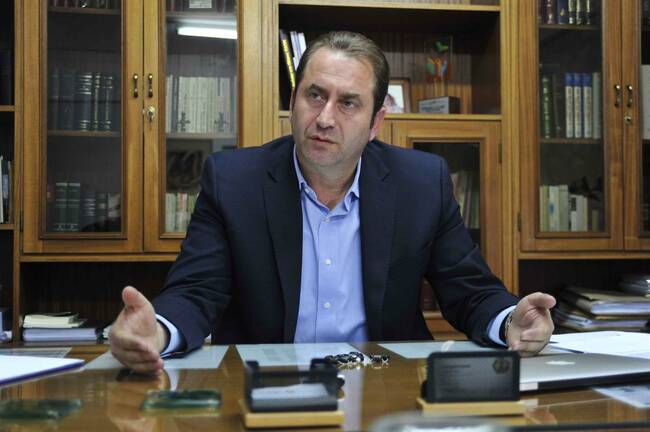
The prospects of a Greek-Turkish dialogue, Famagusta and the solution of the Cyprus problem – Interview with Yiorgos Loucaides
30 August 2020 HARAVGI newspaper
Interview with Yiorgos Loucaides, AKEL Political Bureau member and Parliamentary Representative:
“Our actions must be directed towards mobilizing the international community”
- What can we expect from an upcoming Greek-Turkish dialogue? What role could the European Union play regarding Turkey’s provocative actions in the Cyprus Exclusive Economic Zone (EEZ) and in de-escalating the tensions, taking into account the German Presidency of the Council of the European Union?
First of all, we must hope that the preconditions will be created for the start of such a Greek-Turkish dialogue in the near future.
Unfortunately, developments, and in particular Turkey’s ongoing aggression, are undermining this prospect. That, however, should be the goal, given that if we remain within the vicious circle of tension created since the Crans Montana conference and onwards, we will be even more trapped in a framework that only serves Turkey.
Our goals are served more effectively when entering a framework of dialogue, which must be conducted in accordance with the principles of international law. Within such a context, we, as the result has shown, can muster much more support and solidarity towards our efforts from the international community and the Republic of Cyprus’ associates in the EU.
On the contrary, within a context of military escalation and tension, Cyprus had recorded poor to zero results in confronting Turkey’s aggression and fait accompli. For that reason, at a time when we are rightly asserting more effective solidarity on the part of Cyprus’ EU associates in the face of Turkey’s aggression, we must at the same time take initiatives to change the agenda through the resumption of the negotiation procedure for a solution to the Cyprus problem from where it had remained at the Crans Montana conference.
- What is your comment on the actions of the occupying regime for the opening of the fenced area of Varosha? In your opinion, what actions should the Republic of Cyprus take to prevent the imposition of new fait accompli?
The actions of the ultra-right illegal regime in the occupied territories, and Turkey too, are unacceptable, illegal, deplorable and are undermining the prospects of a solution to the Cyprus problem on the basis of the agreed framework.
We must not forget, however, the courageous and critical stance taken by the Turkish Cypriot leader Mustafa Akinci, as well as of the Turkish Cypriot opposition parties, which reject actions that violate the framework of the UN resolutions and international law.
Our actions must be directed towards the greatest international and European mobilization aiming at their intervention to prevent the imposition of a new and possibly fatal fait accompli, which will put an end to the efforts to resolve the Cyprus problem.
But the most appropriate response to the efforts of Turkey and the illegal Tatar/Ozersay regime in the occupied areas will, in this case too, be the resumption of negotiations from the point where they had left off at Crans Montana.
- Is there a desire to convene a meeting of the National Council to examine developments both with regards the Eastern Mediterranean and the fenced-off area of Famagusta? If a meeting of the leaders of the political parties is convened, are there any prospects for a change in the tactics being applied?
The sessions of the National Council alone (Note: an advisory to the given President council on the Cyprus problem composed of all the parliamentary parties) are not enough, but what is primarily demanded is for the handling of the Cyprus problem to get back on the correct path.
The President of the Republic and the negotiator must at long last stop saying on thing, meaning something else and do more with regards the form of the solution but also the tactics he pursues.
Unfortunately, regressions, improvisations, the dogmatic implementation of a one-dimensional foreign policy and the wrong assessments of the given conditions have led to three years of a fruitless passage of time after the impasse at the Crans Montana conference. In combination with Turkey being praised for its stance in the negotiations and with responsibilities being apportioned on the Greek Cypriot side as well for the stalemate, Turkey has been greatly facilitated in promoting new fait accompli. It is not by chance, consequently, that we have found ourselves in front of the tsunamis of negative developments on the Cyprus problem about which not only we as AKEL had been warning about, but at some point the leadership of ruling DISY [arty did so too.




